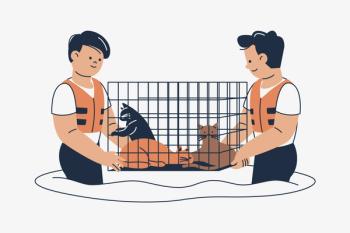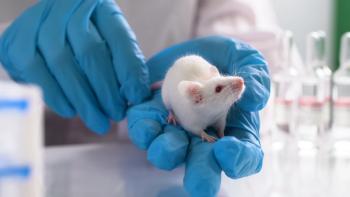
- dvm360 October 2019
- Volume 50
- Issue 10
A day in the life: State public health veterinarians at work
Ever wonder what your state public health vet does? Quite a lot, it turns out, including manning the front lines of zoonotic disease control.
A typical day for Danielle Stanek, DVM, BS, is never typical.
On a single day last October, Dr. Stanek-the state public health veterinarian (SPHV) for Florida-responded to several rabies-related calls, participated in a state agricultural call related to Hurricane Michael response in the Florida panhandle, consulted with state agricultural pest control experts on vector control for a hurricane-related vector issue, assisted hurricane-impacted counties with animal bite follow-up and consulted with county health departments on possible human orf (contagious ecthyma) and brucellosis cases.
Dr. Stanek has been Florida's SPHV for a little over a year. For 10 years prior, she was the program manager for the Florida Department of Health's Zoonotic and Vectorborne Disease Program. “It's wonderful to have a job that allows you to help both people and animals,” Dr. Stanek says of her current position. “Public health professionals in general are some of the most caring professionals I have had the pleasure to work with. There is always some new question to address, so the job never gets boring.”
According to the National Association of State Public Health Veterinarians (NASPHV), SPHVs shouldn't be confused with state veterinarians. Though the two positions may intersect, SPHVs work primarily for the state health department, whereas the state veterinarian traditionally works for the state agricultural department.
According to the NASPHV's website, “SPHVs generally work in zoonotic disease control and prevention, while state veterinarians primarily target livestock diseases (some of which can be zoonotic) and their activities may sometimes be considered to concentrate on benefits and protection to livestock and the livestock industry.”
Almost every state has a public health veterinarian. Certain job responsibilities extend across all states, but there may be additional responsibilities specific to a particular state. “There are some standard sorts of things that are part of the rubric of [being an SPHV], such as rabies control,” observes Curtis Fritz, DVM, PhD, MPVM, DACVPM, the SPHV with the California Department of Public Health. “But beyond that, it can be very diverse. Some [SPHVs] may also serve as their agricultural state veterinarian. They may be in departments other than public health.”
Dr. Fritz's office oversees three statutory programs: rabies surveillance and control; wild animal importation, permitting and quarantine; and psittacosis prevention and control. “Those are the traditional, obligatory responsibilities for the section,” he said. “But our duties and actions are much broader than that, and essentially cover just about any zoonotic disease that presents itself.”
Indeed, the issues that an SPHV may have to address can be quite broad. “We collect a lot of information about reportable diseases, more than 10,000 cases a year,” says Connie Austin, DVM, MPH, PhD, the SPHV for Illinois. “Everything from rabies to Brucella, Salmonella and E. coli. We've also had some weird outbreaks like monkeypox. We study the case reports and try to prevent outbreaks or mitigate what is happening.”
Not everything an SPHV deals with is directly animal related. In March 2018, Dr. Austin's office was enlisted when several people developed severe coagulopathy after smoking a synthetic form of marijuana known as K2 that had been contaminated with a rodenticide. “The users were very sick,” Dr. Austin recalls. “Our group is the only one that does acute epidemiology, so we ended up taking it on. It was interesting trying to figure out all the ways to get people treated and get the word out so law enforcement could get K2 off the market.”
In another incident, Dr. Austin's office was called in to deal with an outbreak of cyclosporiasis, a parasitic infection that can cause severe diarrhea. “We had over 1,000 cases, whereas we usually get 10 to 30 a year,” she says.
While SPHVs usually don't treat pets, their work occasionally does bring them into contact with community veterinarians. “SPHVs often provide consultation to veterinarians about zoonotic disease issues, such as rabies or Q fever, and often provide zoonotic/public health education at meetings and conferences that practicing veterinarians attend,” says Ann Garvey, DVM, MPH, MA, the president of NASPHV and the SPHV and deputy state epidemiologist for Iowa.
SPHVs also work closely with their state animal health officials, Dr. Garvey notes. “During zoonotic disease issues, outbreaks and emergencies, SPHVs coordinate closely with these positions to ensure a cohesive and comprehensive response,” she explains.
Because of the diversity of health issues SPHVs deal with, and the number of different state agencies with which they interact, the One Health concept is prominent.
“Two of my mentors, Drs. Lisa Conti and Carina Blackmore, take every opportunity to highlight that the strongest public health and veterinary medicine practices are based on One Health,” says Dr. Stanek. “Although we may not always recognize this consciously, it is a concept that is at the heart of what we do on a daily basis, whether it's investigating antibiotic-resistant campylobacteriosis in puppies and their owners or working toward rabies prevention and control. Human and animal health are closely intertwined, and the health of our environment affects us all.”
Don Vaughan is a freelance writer based in Raleigh, North Carolina. His work has appeared in Military Officer, Boys' Life, Writer's Digest, Mad and other publications.
Articles in this issue
about 6 years ago
Fetch dvm360 keynote sneak peek: The secret to work-life balanceabout 6 years ago
10 vet tech superstars to followover 6 years ago
Letters to dvm360: Sounding off on DCM dilemmaover 6 years ago
Eleanor Green joins Animal Policy Group, will leave Texas A&Mover 6 years ago
Veterinary products now and for future wowover 6 years ago
A horse vet goes to the airport ...over 6 years ago
Build the bond to reach millennial pet ownersNewsletter
From exam room tips to practice management insights, get trusted veterinary news delivered straight to your inbox—subscribe to dvm360.




